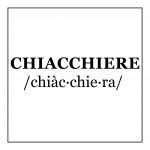GRAZIE
/grà·zie/ [‘grattsje] “gruh-zee-EH”
Words by Bianca Pirrelli
Etymology:
Grazie is the literal plural form of grazia, which comes from latin gratia. In its turn, this is derived from gratus, the latin adjective expressing gratitude.
One could also link the word to the mythological goddesses known as Graces – Gratiae in latin – for Roman mythology, Charites for Greek mythology. They were the goddesses of charm, beauty, nature, human creativity and fertility.
Meaning:
“Grazie!” means “thank you!”.… Did you think that this was it? Well, this is not it, at all.
Both in its plural and – most of all – in its singular form, this word has endless understandings.
One of the most common words Italians say every day is grazie, which mostly expresses gratitude for someone or something. But it actually is so much more than that. Meaning literally graces, this word is useful in many ways.
Grazia can be regarded as grace, delicacy, elegance. From a theological and religious point of view, grazia is the goodness, the grace of God. Moreover, this word can mean mercy, pardon, favor. It can also apply to a legal context. As we can guess, other connotations developed from its original meaning and branched out over time, confirming the extreme success of this word, which encompasses indeed countless linguistic registers and circumstances.
Grazie is the form that expresses gratitude and allows a contact between people who share a conversation, an act of kindness. I like to think of it as the acknowledgment of one’s actions, abilities. It is an important interconnection between people who share a moment, be it intimate or merely formal. Whenever we use this word, we literally give thanks to somebody. It is often a word that we pronounce lightly – almost automatically – even when it is charged with emotional value.
Furthermore, let us not forget that grazie makes great Italian sounds, so energetic and delicate at the same time. And remember, it’s “graziE” (gruh-zee-eh), not “grazi”!

photo by Djo Hm


